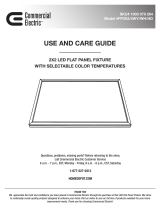Page is loading ...

Remove the fixture and the mounting
package from the box and make sure that
no parts are missing by referencing the
illustrations on the installation instructions.
Carefully unpack and unwrap fixture.
Check that black (3), white (4) and ground
wire(s) (5) are extending from the back of
the fixture. Before wiring fixture to the power
supply, turn off electricity at fuse or circuit
breaker box. Fixture must be grounded to
avoid potential electrical shock and to ensure
reliable lamp starting.
Secure MOUNTING BRACKET (2) to OUTLET
BOX (1) by inserting the two MOUNTING
SCREWS (7) through slots in Mounting Bracket.
MODELS 351-1562
LED CEILING FIXTURE INSTRUCTIONS
GENERAL
All electrical connections must be in accor-
dance with local and National Electrical Code
(N.E.C.) standards. If you are unfamiliar with
proper electrical wiring connections obtain
the services of a qualified electrician.
Remove the fixture and the mounting package
from the box and make sure that no parts are
missing by referencing the illustrations on the
installation instructions.
CAUTION
TURN OFF THE MAIN POWER
AT THE CIRCUIT BREAKER
BEFORE INSTALLING THE
FIXTURE, IN ORDER TO
PREVENT POSSIBLE SHOCK.
PARTS INCLUDED:
1
2
3
5
4
MOUNTING INSTRUCTIONS
SAVE THESE INSTRUCTIONS.
Lift fixture to outlet box. Using WIRE NUTS (6),
connect GROUND WIRE (5) from fixture to green
or bare copper ground (house) wire. If outlet box
is grounded you may fasten fixture ground wire
directly to outlet box. Connect WHITE FIXTURE WIRE
(4) to neutral supply wire. Connect BLACK FIXTURE
WIRE (3) to power supply wire.
Secure FIXTURE (8) to MOUNTING BRACKET by
twisting fixture clockwise against mounting brack-
et. Make sure fixture is firmly locked into place.
READ IMPORTANT SAFETY INFORMATION FIRST ON REVERSE SIDE OF THIS SHEET.
1. Outlet Box (not included)
2. Mounting Bracket (1 piece)
3. Black Fixture Wire
4. White Fixture Wire
5. Ground Wire
6. Wire Nut (3 pieces)
7. Mounting Screws (2 pieces)
8. Fixture (1 piece)
1
2
6
3
57
8
4

SAVE THESE INSTRUCTIONS.
LED CEILING FIXTURE INSTRUCTIONS
1. WARNING: RISK OF SHOCK House electric current
can cause painful shock or serious injury unless
handled properly. For your safety, always remember to:
A. Turn off the power Supply at the fuse or circuit
breaker box before you install the fixture.
B. Ground the fixture to avoid potential electric shocks
and to ensure reliable starting.
C. Double-check all connections to be sure they are
tight and correct.
D. Wear rubber soled shoes and work on a sturdy
wooden ladder.
2. This fixture is designed for use in a circuit protected
by a fuse or circuit breaker. It is also designed to
be installed in accordance with local electrical codes.
If you are unsure about your wiring, consult a qualified
electrician or local electrical inspector, and check your
local electrical code.
3. WARNING: RISK OF CUTS Some metal parts in the
fixture may have sharp edges. To prevent cuts and
scrapes, wear gloves when handling the parts.
4. Account for small parts and destroy packing material,
as these may be hazardous to children.
IMPORTANT SAFETY INFORMATION
This device complies with part 15 of the FCC Rules. Opera-
tion is subject to the following two conditions: (1) This
device may not cause harmful interference, and (2) this
device must accept any interference received, including
interference that may cause undesired operation. Note:
This equipment has been tested and found to comply with
the limits for a Class B digital device, pursuant to part 15
of the FCC Rules. These limits are designed to provide
reasonable protection against harmful interference in a
residential installation. This equipment generates, uses
and can radiate radio frequency energy and, if not installed
and used in accordance with the instructions, may cause
harmful interference to radio communications. However,
there is no guarantee that interference will not occur in a
particular installation. If this equipment does cause harmful
interference to radio or television reception, which can be
determined by turning the equipment off and on, the user
is encouraged to try to correct the interference by one or
more of the following measures: Reorient or relocate the
receiving antenna. Increase the separation between the
equipment and receiver. Connect the equipment into an
outlet on a circuit different from that to which the receiver
is connected. Consult the dealer or an experienced radio/TV
technician for help.
/
















